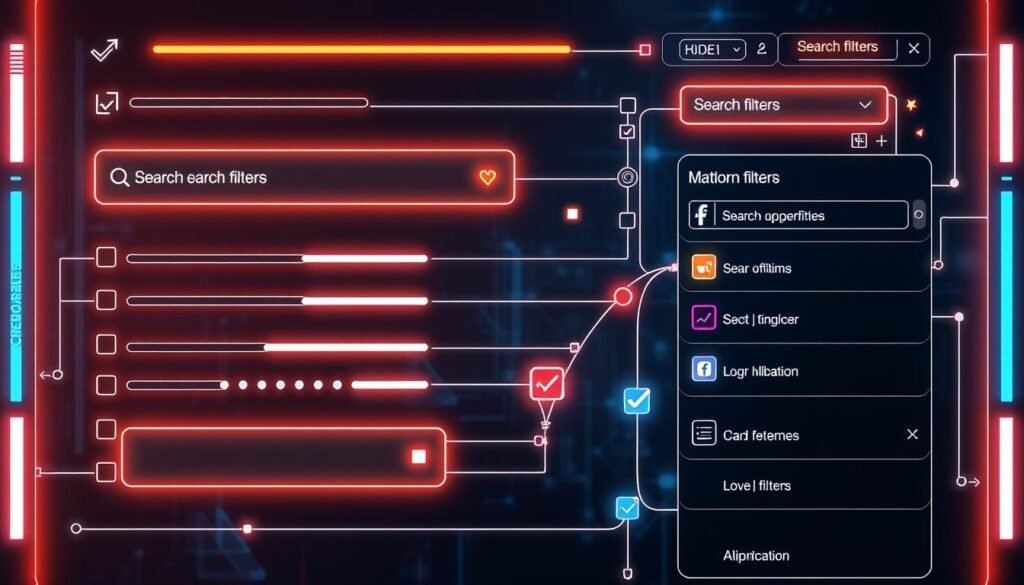As of October 31, 2024, SearchGPT is now available to all ChatGPT Plus subscribers. It will soon be accessible to free, enterprise, and education users too1. This AI search tool was first introduced to 10,000 users in July 2024. Now, it’s a key part of ChatGPT, set to change how we search online1.
SearchGPT uses natural language processing and conversational AI for a better search experience. OpenAI has teamed up with big like Hearst and News Corp. They help make SearchGPT’s information index diverse and trustworthy1.
Unlike regular search engines, SearchGPT gives answers tailored to your question2. You can ask follow-up questions to keep the conversation going1. This makes searching more interactive and personal.
Key Takeaways
- SearchGPT is now a core feature of ChatGPT, available to all ChatGPT Plus subscribers.
- SearchGPT leverages natural language processing and conversational AI to provide a more intuitive and efficient search experience.
- Users can engage in follow-up questions to maintain context and refine their search results.
- SearchGPT offers transparency by providing clear attribution and links to original sources.
- The system taps into a wide range of authoritative sources, including academic institutions, industry-specific platforms, and government websites.
What is Search GPT and Its Purpose?
Search GPT is an AI tool that works with ChatGPT3. It uses OpenAI’s GPT-4 models to give users quick answers to their questions. It looks at the whole context of what you’re asking, making searches more personal and easy to understand3.
Understanding the Basics of Search GPT
Search GPT is made for finding and getting information, using advanced AI to answer questions well3. It keeps the chat-like feel of ChatGPT, letting you ask more questions and get better answers3. It uses Bing’s big database to keep info current and adds cool features like graphs and maps4.
How It Differs from Traditional Search Engines
Unlike Google, which ranks pages based on relevance, Search GPT gets complex questions better3. It talks with you, making your searches more effective and giving answers that feel like they come from a person3. It also gives you answers that fit what you’re looking for, making searches more personal3.
While ChatGPT is for chatting, Search GPT is all about finding info fast3. It’s different from simple AI tools that just give quick answers3.
Search GPT is a big leap in finding information online, combining AI with easy-to-use chat34.
Getting Started with Search GPT
Search GPT makes advanced search easier. It uses the latest in natural language processing and context awareness5. OpenAI, the makers of ChatGPT, created Search GPT. It aims to give you better search results by understanding your needs and the content’s quality5.
Setting Up Your Access
To start with Search GPT, you need a ChatGPT Plus subscription6. This premium service lets you use SearchGPT. It’s part of the ChatGPT app on iOS, Android, macOS, and Windows6.
Familiarizing Yourself with the Interface
The Search GPT interface is easy to use. It’s clean and simple6. It uses Microsoft’s Bing and other tech for a unique search experience6. A special feature is the sources sidebar, which links to the content used for your search6.
Search GPT focuses on content quality and what you’re looking for5. It doesn’t just look at keywords and links like old search engines5. This means you get more personalized and accurate results5.
Search GPT is great for research, creating content, or exploring new topics5. Learning how to use it can make your search tasks easier5.

Crafting Advanced Search Queries
Using SearchGPT means you need to make your search queries count. It’s designed to understand natural language, so you can ask questions like you would a friend7. This makes it different from old-school search engines that just look for keywords7.
Using Keywords Effectively
To get the best out of SearchGPT, pick specific keywords that match what you’re looking for. Adding the right terms and examples helps narrow down your search. This way, you get answers that really fit what you need8.
Incorporating Boolean Operators
Even though SearchGPT doesn’t use “AND,” “OR,” and “NOT” directly, you can use similar ideas. You can set dates, types of content, or include several related terms. This helps you find exactly what you’re looking for, even for hard or specific topics7.
Learning to make advanced search queries unlocks SearchGPT’s full power. You’ll get smart, relevant answers for anything from school work to business tips9. These skills make finding information easy, no matter how big the topic9.
“The true power of SearchGPT lies in its ability to understand the nuances of natural language and provide tailored responses that go beyond the limitations of traditional search engines.”
| Feature | Description |
|---|---|
| Inline Citations | SearchGPT shows inline citations for its answers, making the info clear and trustworthy7. |
| Multimedia Content | The system can add images and videos to your search results7. |
| Sidebar View | SearchGPT has a sidebar that lists all sources used, letting you dive deeper7. |
| Source Specification | You can tell SearchGPT to focus on certain websites or domains for better results7. |
| Time Range Refinement | SearchGPT lets you search by specific time periods, so you get the latest info7. |
Utilizing Filters for Better Results
Exploring the vast world of natural language processing10 gets easier with filters. SearchGPT, a top conversational AI tool, has many filters to make your searches better. These filters help find more precise and relevant answers to your questions.
Date Filters
SearchGPT’s date filters are very useful. You can set dates to find the latest or oldest information10. This makes searching more focused and efficient, giving you results that match your time preferences.
Content Type Filters
SearchGPT also lets you filter by content type10. You can look for news, academic papers, or multimedia content10. This customization helps find the most relevant and reliable information for your needs10. It makes SearchGPT a powerful tool for many uses.

SearchGPT’s filters make it stand out from other search engines10. You can use these filters easily through simple questions10. This advanced natural language processing and semantic search lets you find information more efficiently. It’s great for research, content creation, and more.
Refine Your Search with Synonyms and Phrases
SearchGPT’s advanced language understanding lets users refine their searches. It can spot related terms and concepts, expanding the search without needing to be told11. This AI-driven semantic understanding finds relevant results, even when synonyms or related phrases are used in the query11.
Expanding Your Query with Similar Terms
Users can use SearchGPT to find more by adding similar words and phrases. This way, you can find a wider range of relevant information. It helps with query understanding, information retrieval, and knowledge extraction11. It’s great for niche or technical topics, where the terms might differ.
Using Quotation Marks for Exact Phrases
SearchGPT also lets users search for exact phrases by using quotation marks12. This is super useful for finding specific quotes, technical terms, or important phrases. By using quotation marks, you get results that match your exact query, making your search more precise12.
| Feature | Description | Benefits |
|---|---|---|
| Synonym Recognition | SearchGPT can identify related terms and concepts, expanding the search scope. | Enhances query understanding and knowledge extraction. |
| Exact Phrase Matching | Users can use quotation marks to search for specific phrases, similar to traditional search engines. | Improves the precision of information retrieval. |
By using these advanced search features, users can make their queries more precise. They can find more relevant information and unlock SearchGPT’s full capabilities in query understanding, information retrieval, and knowledge extraction.

Advanced Techniques for Specific Searches
Online search sometimes needs more than a simple question. SearchGPT uses advanced tech to give you exactly what you need. Let’s look at two areas where SearchGPT really stands out.
Searching for Definitions and Explanations
SearchGPT is great at giving detailed answers to complex questions13. It can explain technical or academic topics in simple terms. This is super helpful for students, researchers, and experts who need to understand hard subjects.
Finding Uncommon or Niche Information
Traditional search engines might not find what you’re looking for. But SearchGPT can dig up rare or specialized info from many sources14. It uses its smart search and understanding of language to find what you need, even if it’s hard to find.

“SearchGPT’s ability to understand context and intent helps in delivering relevant results for specific, technical, or obscure queries that might be challenging for traditional search engines.”
Whether you need detailed explanations or rare info, SearchGPT is a game-changer. It uses the latest in language models and search tech to help you find what you’re looking for15. This makes it easier to explore and learn with precision and speed131415.
Enhancing Search GPT Results with Context
To get the most out of SearchGPT, it’s key to give it the right context and background info16. SearchGPT can handle complex searches well thanks to its natural language skills16. This makes it a big help for fields like fintech, insurtech, and cybersecurity, where the latest info is vital16.
Providing Background Information
Adding more context to SearchGPT helps it find better and more relevant results17. It uses AI to get what you mean behind your searches17. This means users get answers faster and more accurately17.
Asking Follow-Up Questions
16 SearchGPT lets you ask more questions, keeping the conversation going16. This is great for exploring complex topics or getting more details16. It makes searching smoother and more helpful16.
| Feature | Benefit |
|---|---|
| Contextual Understanding | Provides more accurate and relevant search results17 |
| Conversational Interface | Allows for follow-up questions and a more fluid search experience16 |
| Efficient Information Retrieval | Saves time and effort for users17 |
By using SearchGPT’s advanced features and adding context, users can have a better search experience1617. This makes finding the info they need easier and more productive1617.
“SearchGPT represents a significant advancement in search technology by providing a smarter, more intuitive search experience for users.”17
Common Mistakes to Avoid
When using Search GPT, it’s key to watch out for common mistakes. One big error is
overloading your query with too many keywords
. Adding too many keywords can confuse the model and give less relevant answers18. Instead, aim for clear, concise queries that give the rightcontext and specificity for what you need18.
Another mistake is
neglecting the importance of context awareness
. Search GPT needs context to give good insights. Without enough background or details, you might get vague or wrong answers18. Adding the right context can make your search results better and more accurate18.
Remember, Search GPT is not perfect. It can make mistakes like giving wrong facts, bad code, or wrong math answers18. To avoid these, always check important info from trusted sources and edit what Search GPT gives you carefully18.
By avoiding these mistakes and using Search GPT’s context awareness well, you can get the most out of it. This way, you’ll find valuable insights more accurately and precisely181920.
| Mistake | Description |
|---|---|
| Overloading Queries | Including too many keywords in a single query can confuse the language model and lead to less relevant results. |
| Neglecting Context | Failing to provide adequate background information or relevant details can result in overly general or inaccurate responses. |
| Relying on Inaccuracies | Search GPT outputs can sometimes contain mistakes, such as inaccurate facts, improper code generation, and incorrect responses to simple math problems. |
“Implementing additional tools and processes on top of ChatGPT’s API can help mitigate the platform’s limitations and enhance outcomes.”18
Real-World Applications of Search GPT in Various Fields
Search GPT, an advanced search engine, is used in many fields. In academic research, it helps scholars find studies quickly, summarize papers, and spot trends21. It’s great for professionals needing quick, detailed information because it understands context well.
For those in content creation and marketing, Search GPT is a big help. It can come up with new ideas, find stats, and analyze trends21. It makes research and idea generation faster, improving work quality.
But, Search GPT should not be the only source for research22. It’s best used as a starting point. Always check results with traditional methods. Its strength is in giving context-aware results and filtering, but it can’t replace critical thinking.
FAQ
What is SearchGPT and what are its key features?
How does SearchGPT differ from traditional search engines?
How can I access and use SearchGPT?
How can I craft effective search queries in SearchGPT?
What filtering options are available in SearchGPT?
How can I use synonyms and phrases to refine my searches in SearchGPT?
What are the capabilities of SearchGPT in providing definitions and explanations?
How can I enhance my search results by providing additional context?
What are some common mistakes to avoid when using SearchGPT?
How can SearchGPT be applied in various fields?
Source Links
- The Ultimate guide to SearchGPT – https://www.brightedge.com/searchgpt
- What is OpenAI SearchGPT? How it works and How to Get it? – GeeksforGeeks – https://www.geeksforgeeks.org/what-is-search-gpt/
- What is Search GPT – How it Works, Benefits, Use Cases – Ranking Serve – https://rankingserve.com/what-is-search-gpt-how-it-works/
- Search GPT: all about the tool and its impact | WEBJUMP – https://webjump.ai/en/search-gpt/
- SEO For Search GPT: How To Optimise For Better Visibility – https://thedigitalxx.com/seo-for-search-gpt/
- SearchGPT: What you need to know about OpenAI’s search engine – https://searchengineland.com/searchgpt-what-you-need-to-know-446455
- I found these 5 tips helped me get the most out of ChatGPT Search – https://www.tomsguide.com/ai/chatgpt/5-tips-for-getting-the-most-out-of-searchgpt
- 7 Essential Tips to Master ChatGPT Search – https://medium.com/@kasata/7-essential-tips-to-master-chatgpt-search-9e739ee83cda
- How to Get Found on SearchGPT, ChatGPT, and Google AI Results – https://www.sociallybuzz.com/how-to-get-found-on-searchgpt-ai-results/
- How ChatGPT Search Results Work – https://dejanmarketing.com/gpt-search/
- Exploring searchGPT: The Future of AI-Powered Search – https://lseo.com/exploring-searchgpt/
- How to improve your ChatGPT ‘on your data’ solution? – https://medium.com/@imicknl/how-to-improve-your-chatgpt-on-your-data-solution-d1e842d87404
- Implementing ChatGPT History Search Capability – https://community.openai.com/t/implementing-chatgpt-history-search-capability/225778
- OpenAI brings a new web search tool to ChatGPT – https://www.technologyreview.com/2024/10/31/1106472/chatgpt-now-lets-you-search-the-internet/
- GPT Meets Site Search: Using Generative AI For Improved Site Search – https://medium.com/design-bootcamp/gpt-meets-site-search-using-generative-ai-for-improved-site-search-2140adb52810
- How OpenAI’s SearchGPT is Transforming Search | Envisionit – https://envisionitagency.com/blog/how-searchgpt-is-redefining-ai-powered-search/
- How to Prepare for SearchGPT: Your Comprehensive Guide – https://eliashaider.medium.com/how-to-prepare-for-searchgpt-your-comprehensive-guide-3d81ac7bb494
- ChatGPT fails: 13 common errors and mistakes you need to know – https://searchengineland.com/chatgpt-fails-errors-mistakes-400153
- ChatGPT: how to use and what to be afraid of – https://marketing.link/chat-gpt-how-to-use-it-and-what-to-be-aware-of/
- 15 Common Chat GPT Limitations And How To Overcome Them – Springs – https://springsapps.com/knowledge/15-common-chat-gpt-limitations-and-how-to-overcome-them
- SearchGPT: Stepping Into A New Horizon For Online Searching – https://www.linkedin.com/pulse/searchgpt-stepping-new-horizon-online-searching-dr-tuhin-banik-vajpc
- 50 ChatGPT Use Cases with Real-Life Examples – https://research.aimultiple.com/chatgpt-use-cases/
